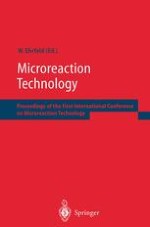1998 | OriginalPaper | Buchkapitel
Porous Silicon as the Carrier Martix in a Micro Enzyme Reactor to Achieve a Highly Efficient and Long-Term Stable Glucose Sensor
verfasst von : Johan Drott, Kjell Lindström, Lars Rosengren, Thomas Laurell
Erschienen in: Microreaction Technology
Verlag: Springer Berlin Heidelberg
Enthalten in: Professional Book Archive
Aktivieren Sie unsere intelligente Suche, um passende Fachinhalte oder Patente zu finden.
Wählen Sie Textabschnitte aus um mit Künstlicher Intelligenz passenden Patente zu finden. powered by
Markieren Sie Textabschnitte, um KI-gestützt weitere passende Inhalte zu finden. powered by
Porous silicon with its spongious structure and vast surface enlargement was investigated as the carrier matrix for immobilised enzymes in micro enzyme reactors.The microreactors were micromachined, in (110) silicon (p-type, 20–70 Ω.cm) by anisotropic wet etching, giving a parallel trench structure comprising 32 channels, 50 µm wide, spaced 50 µm apart and 250 µm deep. The surface enlarging porous layer on the reactor structures were achieved by anodising the reactors in a solution of hydrofluoric acid and ethanol. In order to evaluate the surface enlarging effect of different pore morphologies, the anodisation was performed at three different current densities, 10, 50 and 100 mA.cm−2.Glucose oxidase was coupled to the surface of the porous microreactors and a non porous reference reactor. The enzyme activity of the microreactors was recorded and compared with the non-porous reference reactor.Long-term stability measurements of glucose oxidase coupled to a planar porous silicon surface were performed. The porous layer was achieved on a (111) silicon sample; epilayer, n on n+ (6.8–9.2 Ω cm on 0.0015 Ω cm), anodised at 100 mA.cmℒ2 for 5 minutes.The studies of the glucose turn-over rate in the different micro reactors clearly demonstrated the surface enlarging effect of porous silicon as an enzyme carrier matrix. An increase in enzyme activity by a factor of 100, compared to the non porous reference, was recorded for the reactor anodised at 50 mA.cm−2. The results also establish the possibility to fabricate porous silicon on high aspect ratio microstructures.The long-term stability measurements displayed a high storage stability of the porous silicon carrier matrix, 2% loss after 5 months refrigerated storage. Steady state glucose loading (0.5 mM) of the GOD activated porous matrix showed a loss in enzyme activity of 56% over 4 days.
